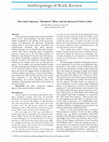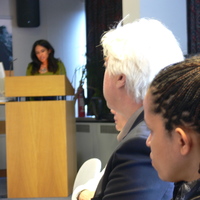Papers by Gretchen Purser
Research in the Sociology of Work, 2024
It has been 50 years since the publication of Studs Terkel's groundbreaking book, Working, which ... more It has been 50 years since the publication of Studs Terkel's groundbreaking book, Working, which consists of a compilation of interviews carried out with over 130 workers in the United States. In this chapter, the author revisits this masterpiece, which offers a penetrating analysis of the dehumanization and degradation of work. The author argues that Working is an ode to, and guide for, ethnographic scholarship on work and that it remains as powerful and relevant today as when it was originally published a half of a century ago.
Critical Sociology, 2024
When I was invited to speak as part of this plenary panel, I was told not to give a typical resea... more When I was invited to speak as part of this plenary panel, I was told not to give a typical research talk, but to prepare, rather, a political talk. The only guidance I was given was to 'throw fire'. It's kind of a tall order when, as I'm sure many of you would agree, it feels like everything is already burning!

Research in the Sociology of Work, 2024
In this chapter, we underscore the enduring importance of research on work, workers, labour marke... more In this chapter, we underscore the enduring importance of research on work, workers, labour markets, and the places and spaces of work. We then examine the particular and valuable contributions that come from ethnographic research in providing detailed studies of work, particularly when these are situated and interpreted in their wider socio-political contexts. We discuss the key dimensions of ethnography before overviewing the contributions to the volume. The volume presents cutting-edge ethnographic research on contemporary worlds of work and the experiences of workers from a range of contexts including an alternative community, working online, the gig economy, and the hospitality industry. Alongside novel empirical chapters, the collection includes the reflections of ethnographers with regards to, for example, the experience as a young female management researcher working amongst journalists in a media firm, personal feelings of precarity within and beyond the field, and how to navigate the challenges of researching inequalities ethnographically.

Social Service Review, 2022
In this article, we examine the experiences of formerly incarcerated individuals living in a bran... more In this article, we examine the experiences of formerly incarcerated individuals living in a brand-new reentry housing facility in Syracuse, New York, that we call "New Beginnings." At this site, a select group of returning residents are placed in permanent supportive housing or shelter beds. In analyzing the experiences of residents, we borrow from Avery Gordon's conception of "haunting" to explain the seething presence of the prison in a facility designed for its afterlife. We find that despite intensive service provision intended to help residents move on from their carceral pasts, New Beginnings reanimates the specter of the prison for its formerly incarcerated residents. Throughout, we present New Beginnings as an illustrative case study that demonstrates the blurriness of prison boundaries and the contradictions of contemporary reentry programs and policies.

Journal of Contemporary Ethnography, 2021
Prisoner reentry is widely recognized as a hybrid project of poverty governance situated at the i... more Prisoner reentry is widely recognized as a hybrid project of poverty governance situated at the intersection of the welfare state and penal state. Numerous scholars have examined the devolved terrain and organizational dynamics of reentry services. Still others have emphasized the particular challenges and importance of housing to the reentry process. However, few have examined how reentry organizations secure or manage housing for their clients, particularly in an era marked by a widespread housing affordability crisis and the retrenchment of public housing in favor of privatized subsidized housing provision. In this article, we present an ethnographic case study of one particularly illustrative site: "New Beginnings," a new and novel housing development in Syracuse, NY, codeveloped and comanaged by a prisoner reentry organization and a local housing authority. We show that, despite its ostensible mission to integrate the formerly incarcerated and provide much-needed housing to the poor, the development reproduces the stigma of criminal history, producing a sense of ambivalence among residents, who are both grateful for the quality of their new housing and resentful of ongoing forms of carceral supervision and control. In turn, formerly incarcerated residents uphold their participation in the program as a way to distinguish themselves from traditional public housing tenants, further entrenching dominant narratives about the failures of public housing. These

Critical Sociology, 2020
This article documents how job readiness programs-as anchors of the devolved organizational lands... more This article documents how job readiness programs-as anchors of the devolved organizational landscape of neoliberal poverty governance in the United States-endeavor to instill within the poor not simply the virtue of work, but the virtue of thrift, and thus orient them to "both sides of the paycheck." Using a comparative ethnographic study of two community-based, government-funded nonprofit job readiness programs, we show that this pedagogic focus on budgeting is central to the overall goal of conditioning clients to embrace and endure a degraded labor market. Recognizing that most participants will remain poor with or without low-wage employment, these programs suggest that it is as crafty consumers that participants may retake control of their lives. Despite the programs' differing target populations and racialized and gendered logics, both attempt to accommodate participants to the dictates of the neoliberal economic order: jobs are hard to find and, even if you get one, wages will not be enough.
Collaborating for Change: a Participatory Action Research Casebook, 2020
The dairy industry in New York-and indeed nationwide-has increasingly turned to undocumented immi... more The dairy industry in New York-and indeed nationwide-has increasingly turned to undocumented immigrants as its primary workforce. Though liv ing in conditions of isolation and invisibility, these workers have helped the state earn the title of number-one yogurt producer in the nation. This chapter introduces a community-based participatory action research (PAR) project that we carried our to expose the working and living conditions of farmwork ers as well as build their strategic capacity to organize for change. We describe how the research process served as a tool for conducting outreach, building worker solidarity, and developing worker leadership. We then describe how the research product is being mobilized, or "milked." for the purposes of effect• ing policy change.
Labor and Punishment: Work In and Out of Prison, edited by Erin Hatton, 2021

Anthropology of Work Review, 2019
This article focuses upon a previously overlooked aspect of the "flesh-peddling" day labor busine... more This article focuses upon a previously overlooked aspect of the "flesh-peddling" day labor business, widely recognized as the epitome of the precarious regime of employment. By physically stockpiling surplus labor to meet their clients' immediate and unpredictable demands, day labor agencies inadvertently give rise to informal day labor markets outside their doors. Drawing upon ethnographic research carried out in the day labor agencies of Baltimore and Oakland, I examine how day laborers and agency dispatchers negotiate and navigate the practice of what I call "backdoor" hiring, wherein employers hire workers from, but not through, the agency. The struggles surrounding backdoor hiring not only challenge and complicate the binary division in the literature between formal and informal day labor, but reveal the dogged efforts of dispatchers to cultivate workers' dependency, restrict their mobility, and curtail their labor-market freedom. This article thus contributes to the growing debate within anthropology and related disciplines about the conditions exacerbating unfreedom at the bottom of the labor market.

Job readiness programs are a propitious site for investigating the literal making of the US worki... more Job readiness programs are a propitious site for investigating the literal making of the US working class. With the imposition of workfarist policies, these programs have become a mainstay of social service provision to, and paternalist management of, the poor. We draw upon ethnographic fieldwork carried out in two different job readiness programs to illustrate variations in the ideological frameworks for this project of working class formation. Our first case, a prominent faith-based program targeted to the homeless, draws upon scripture to produce what we call Bdisciples^ who treat work as a biblical mandate and way of serving the Lord. Our second case, a local nonprofit program serving welfare recipients and other poor job seekers, draws upon motivational discourse and practices to produce Bdreamers^ who cling to the promise that work delivers both upward mobility and personal fulfillment. Despite their differing languages and logics, both programs aim to accommodate participants to the world of low-wage work, instill within them the moral value of labor, and develop worker subjectivities premised on the obfuscation of class and the optimization of employability.
Occupational Photojournalist, Earl Dotter (www.earldotter.com), generously provided the Cover Pho... more Occupational Photojournalist, Earl Dotter (www.earldotter.com), generously provided the Cover Photograph and the images on the following pages of this report: 27, 28, 33, 35, 42 and 48. Design Action worked on the layout and design.

Ethnography, 2018
In the wake of welfare reform, there has been growing scholarly attention to 'religious neolibera... more In the wake of welfare reform, there has been growing scholarly attention to 'religious neoliberalism' and, specifically, to the practices and politics of faith-based organizations in neoliberalized landscapes of social service provision. While much of this scholarship has suggested a seamless 'fusion' between conservative evangelicalism and neoliberal ideology, ethnographic research has tended to reveal the far more complicated, and contradictory, reality of evangelical social projects as they play out on the ground. Presenting the first in-depth ethnography of a faith-based job-readiness program, this article examines the contradictory logics operative within the project of what we call 'evangelizing employability.' Targeting joblessness, the program urges entrepreneurial independence. Targeting godlessness, the program urges righteous dependence on God. The project of evangelizing employability reveals the extraordinary utility of religion for the enactment of neoliberal priorities and policies of work enforcement and contributes to our understanding of religious neoliberalism and its class-based contradictions.
The City is the Factory: New Solidarities and Spatial Strategies in an Urban Age, 2017

Qualitative Sociology, 2017
The 1996 passage of welfare reform radically reshaped the principles and practices of poverty man... more The 1996 passage of welfare reform radically reshaped the principles and practices of poverty management in the U.S. On the one hand, it brought about an end to welfare as an entitlement and imposed rigid time limits, work requirements, and a programmatic supply-sided focus on “job-readiness.” On the other hand, it permitted and promoted the expansion of faith- based organizations in the provision of social services. This ethnographic case study of a prominent faith-based job-readiness program--Jobs for Life (JFL)--is situated at the underexplored nexus of these two trends. Drawing upon participant observation in a JFL class, in-depth interviews with class instructors and participants, and content analysis of organizational materials, this article documents the program’s use of biblical principles and teachings to expound on the moral irreproachability of work and to fabricate “employable” subjects who submit themselves to both God and the employer. At play is a project that we call the “righteous responsibilization” of the poor, a responsibilization achieved through religious salvation. The case of JFL, we argue, not only extends our understanding of “religious
neoliberalism” (Hackworth 2012), revealing how it shapes the process of subjectification and practices of poverty management. It also remediates a tension at the heart of neoliberal ideology between its emphasis on individualistic entrepreneurialism and its demand for submission to the abstract, alien decrees of the market. In the religious neoliberal framework exemplified by JFL, deference to capital is recast as the first step toward the entrepreneurial achievement of individual salvation.

Critical Sociology, May 27, 2014
Although tenant evictions are routine in impoverished urban communities throughout the USA, schol... more Although tenant evictions are routine in impoverished urban communities throughout the USA, scholars of housing and urban poverty have consistently overlooked this social problem. Drawing predominantly upon participant observation on eviction crews in Baltimore, this study examines the social drama of eviction, focusing upon the orchestration and execution of the court-ordered physical removal of tenants and their property. I find that property managers delegate the ‘dirty work’ of dispossession to a dispossessed population and that laborers on eviction crews tend to differentiate and distance themselves from the people they are evicting, adopting the dominant belief that eviction is rooted in the individual, moral deficiencies of the tenant. These findings reveal that those who are excluded from the American ‘paradigm of propertied citizenship’ – the homeless – are used to enforce, and serve to legitimate, that very paradigm. I argue that evictions entail a circle of dispossession, reproduced both materially and ideologically.

Labour, Capital & Society, 2012
"The formal day-labour business is a well-entrenched, multi-
billion dollar industry that exempl... more "The formal day-labour business is a well-entrenched, multi-
billion dollar industry that exemplifies the two most consequential changes in contemporary employment relations: the growth of precarious employment and the increased role of labour market intermediaries. It is an industry premised upon the temporal expropriation and spatial retention of a surplus pool of labour- on-demand. Drawing upon extensive interviews and nearly three years of participant observation working as a day labourer amidst a predominantly homeless, and formerly-incarcerated, African- American workforce in the inner-cities of Oakland and Baltimore, this paper identifies the multifarious functions and broad implications of day labourers’ routinized experience of chronic and obligatory waiting. I argue that this liminal period serves as an instrument of inspection, as an instrument of immobilization and as an instrument to intensify labourer’s investment in the uncertain pursuit of work. This analysis enables us to better understand not only the distinct operations of the day labour business, but precisely how labour is subjugated, dependency is cultivated and precarious and degraded conditions of employment are normalized for those at the bottom of the U.S. labour market.
"

WorkingUSA: The Journal of Labor and Society, Sep 2012
An extensive body of research has documented the barriers faced by ex-offenders in the labor mark... more An extensive body of research has documented the barriers faced by ex-offenders in the labor market. This article presents an ethnographic case study of an industry that actively recruits and makes profitable use of this stigmatized, yet abundantly pliable and easily exploitable, source of labor. In so doing, this article focuses on the qualitative character, as opposed to the quantitative (in)accessibility, of jobs available to the more than half of a million convicts streaming out of prison each year. Drawing upon extensive interviews and participant observation in the day labor agencies of Oakland and Baltimore—where poor, predominantly African-American and formerly incarcerated men clamor for a day’s work—the article documents day laborers’ experience of this precarious employment relationship as a kind of extended incarceration and enduring form of punishment, one that traps them in a forever liminal status. This study highlights the extraordinary vulnerability of formerly incarcerated workers and deepens our understanding of the interface between hyperincarceration and the restructuring of urban labor markets.
Journal of Contemporary Ethnography, Feb 2009
Drawing on interviews and comparative ethnographic fieldwork in two day labor hiring sites (a str... more Drawing on interviews and comparative ethnographic fieldwork in two day labor hiring sites (a street corner labor market and a “regulated” day labor worker center), this article examines the discourses through which Latino immigrant day laborers make sense of, and find dignity within, their ongoing quest for work. My findings reveal a clear pattern of “boundary work” along the center/street divide, wherein each group of day laborers asserts its dignity and masculinity by repudiating what they construe to be the feminine submission exemplified by the other group. I argue that gender both shapes and is shaped through the articulation of these moral boundaries and show how workers’ struggle to attain dignity—in this case, via strategies of social differentiation and distinction—can act against the formation of a collective identity.
Actes de la Recherche en Sciences Sociales , 2006









Uploads
Papers by Gretchen Purser
neoliberalism” (Hackworth 2012), revealing how it shapes the process of subjectification and practices of poverty management. It also remediates a tension at the heart of neoliberal ideology between its emphasis on individualistic entrepreneurialism and its demand for submission to the abstract, alien decrees of the market. In the religious neoliberal framework exemplified by JFL, deference to capital is recast as the first step toward the entrepreneurial achievement of individual salvation.
billion dollar industry that exemplifies the two most consequential changes in contemporary employment relations: the growth of precarious employment and the increased role of labour market intermediaries. It is an industry premised upon the temporal expropriation and spatial retention of a surplus pool of labour- on-demand. Drawing upon extensive interviews and nearly three years of participant observation working as a day labourer amidst a predominantly homeless, and formerly-incarcerated, African- American workforce in the inner-cities of Oakland and Baltimore, this paper identifies the multifarious functions and broad implications of day labourers’ routinized experience of chronic and obligatory waiting. I argue that this liminal period serves as an instrument of inspection, as an instrument of immobilization and as an instrument to intensify labourer’s investment in the uncertain pursuit of work. This analysis enables us to better understand not only the distinct operations of the day labour business, but precisely how labour is subjugated, dependency is cultivated and precarious and degraded conditions of employment are normalized for those at the bottom of the U.S. labour market.
"
neoliberalism” (Hackworth 2012), revealing how it shapes the process of subjectification and practices of poverty management. It also remediates a tension at the heart of neoliberal ideology between its emphasis on individualistic entrepreneurialism and its demand for submission to the abstract, alien decrees of the market. In the religious neoliberal framework exemplified by JFL, deference to capital is recast as the first step toward the entrepreneurial achievement of individual salvation.
billion dollar industry that exemplifies the two most consequential changes in contemporary employment relations: the growth of precarious employment and the increased role of labour market intermediaries. It is an industry premised upon the temporal expropriation and spatial retention of a surplus pool of labour- on-demand. Drawing upon extensive interviews and nearly three years of participant observation working as a day labourer amidst a predominantly homeless, and formerly-incarcerated, African- American workforce in the inner-cities of Oakland and Baltimore, this paper identifies the multifarious functions and broad implications of day labourers’ routinized experience of chronic and obligatory waiting. I argue that this liminal period serves as an instrument of inspection, as an instrument of immobilization and as an instrument to intensify labourer’s investment in the uncertain pursuit of work. This analysis enables us to better understand not only the distinct operations of the day labour business, but precisely how labour is subjugated, dependency is cultivated and precarious and degraded conditions of employment are normalized for those at the bottom of the U.S. labour market.
"